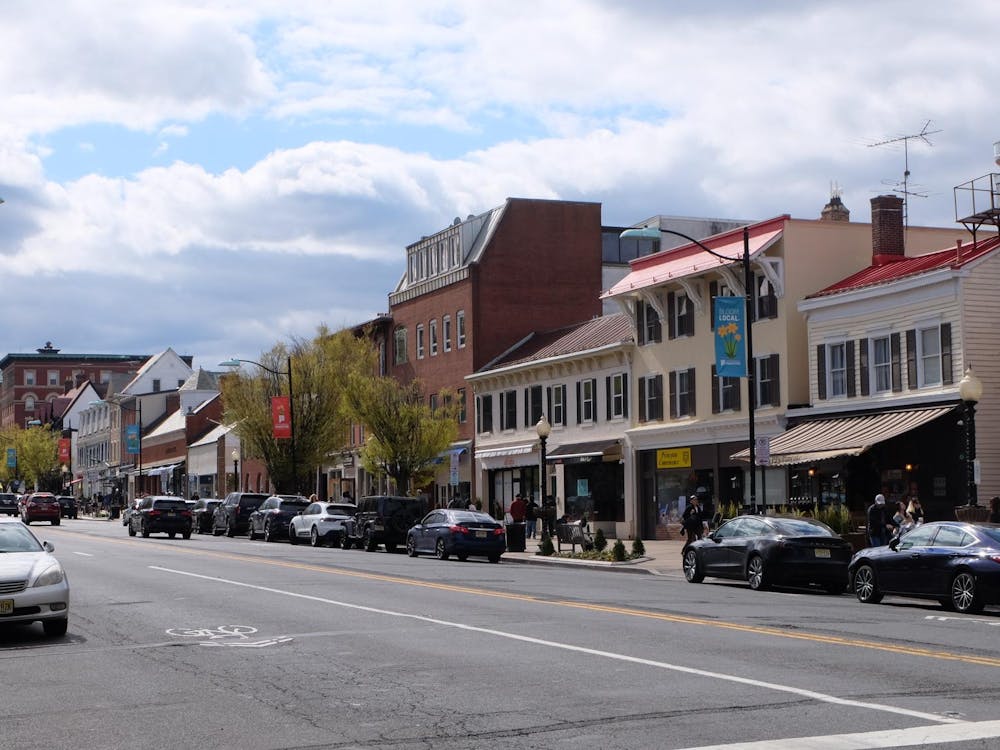Legendary broadcast journalist and author Tom Brokaw presented a lecture titled “The Time of Our Lives” about the American dream and how the United States should focus on service.
“Tom was the anchor and image of NBC News for nearly a generation, and if you’re like me, you’ve probably often wondered what lies behind the instantly recognizable face and voice,” said Wilson School professor Hugh Price, who introduced Brokaw.
“He’s a brilliant student of the American psyche and spirit, the American dream and the American people, and thus a brilliant student of America itself,” Price added, reflecting on the time they shared on the board of the Mayo Clinic.
Brokaw described how his background shaped his views: He was born into a middle-class family in South Dakota, his father a construction supervisor and his mother a postal clerk. Having attended the University of Iowa and later graduating from the University of South Dakota, he described the 1960 election of John F. Kennedy as the moment when “I knew what it was that I wanted to do with my life.”
“[My hope is] that maybe we can have a conversation about America — where we’ve been, where we are and where we need to go,” Brokaw said about his goals for his latest book and his discussions across the country.
“I began to take the temperature of the country,” Brokaw said of his recent travels across the country. “I began to listen more carefully of the anxieties of people.”
“I encountered questions that I never had before through the course of my personal and professional life,” he said. “People were coming up to me and saying with great nervousness — Republicans, Democrats and Independents alike — ‘What happened to the America we thought we knew?’ ”
“The question that troubled me even more in many ways — what I always believed was the heart of the American dream — was that parents and grandparents were saying, ‘Mr. Brokaw, I wonder what you think. I’m just very worried that our children will not have the lives that we’ve had.’ ”
Brokaw described the unique struggles the nation has faced over the past few years and the huge burden he felt has been placed on a small portion of the population.
“The economy unraveled on us, we’re in the two longest wars in our nation’s history and these wars have been fought by less than one percent of our population, with most of them drawn from the working and lower-middle classes,” Brokaw said. “Nothing was asked of the rest of us during all of it ... if we so chose we didn’t even have to think about those wars, we could go about our daily lives, while other families were living in constant fear that the phone would ring.”
Brokaw explained the toll that placing such a significant burden on such a small number has had on the cohesion of America.
“In a democratic society, it is unjust to have less than one percent take the bullets and pay the price. It’s more than unjust; in a way, it’s immoral,” Brokaw emphasized.

“We have to knit ourselves back together again,” he added.
Brokaw explained how the United States should shift its idea of a “better future” for our kids, arguing that we should move away from the traditional quantitative notions of simply having better jobs, a bigger house and more money to something that incorporates “fundamental values in that equation.”
Brokaw said that our hopes for the future should shift to “how we can have more economic justice in America; how we can prepare this country for what we know will be the great competition in the remaining years of the 21st century; how we will finally be able to begin to restore and repair public education system to such a degree that everyone will have an equal opportunity at being well-educated.”
“I think education will be the currency of the 21st century,” Brokaw said.
Brokaw discussed a plan “akin to the G.I. Bill” that he described in his latest book, “The Time of Our Lives: A Conversation About America; Who We Are, Where We’ve Been, and Where We Need to Go Now, to Recapture the American Dream.” His plan would establish six “Public Service Academies” across the country tied to land-grant colleges in cooperation with businesses.
These academies would offer three-year entry-level and post-graduate programs that train Americans in agriculture, medicine, engineering, conflict resolution and other practical fields. He said that the goal of the institutions would be specialized training, so graduates could fan out across the world or be assigned to domestic projects oriented toward service.
These new graduates would “have a new sense of commitment, not just to their country, but to mission and to each other, because they’ve had a shared experience that is unique,” Brokaw said.
A book sale and signing took place after the discussion.
Brokaw’s lecture was held in Richardson Auditorium on Tuesday afternoon. The talk was part of the Wilson School’s lecture series on media and public policy.







